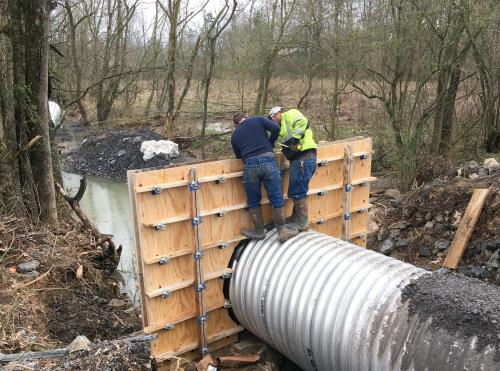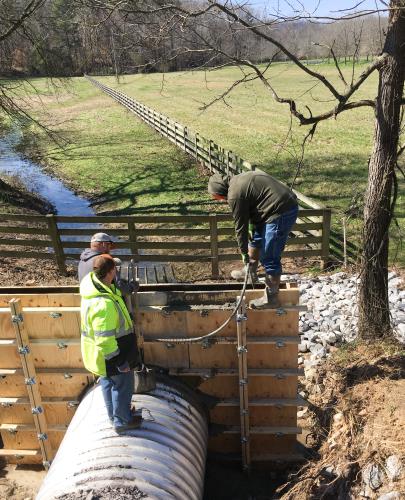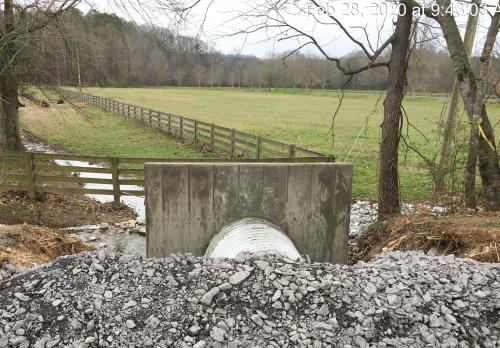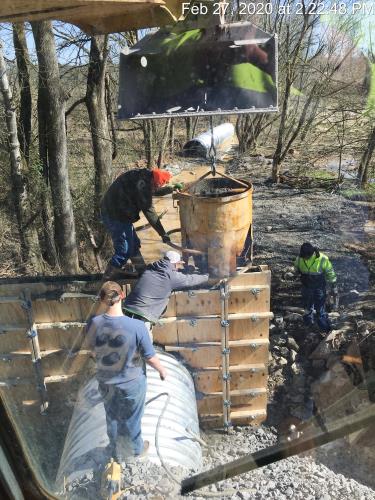
Wesley York (left) and Josh Locke work on a headwall on a cross drain that Whitfield County Public Works crews replaced in February on Dogwood Valley Road.
photo by Mitch Talley

As Alan Marrow (left) observes, Craig Springfield (right) uses a vibrator to consolidate concrete in the headwall at the end of a cross drain replaced on Dogwood Valley Road. Meanwhile, Josh Ray operates the motor for the vibrator, which eliminates air pockets in the concrete to make it stronger.
photo by Mitch Talley

The finished cross drain, with custom headwalls at each end to funnel water more efficiently through the pipe, was completed at a cost of $4,500 by Whitfield County Public Works. The aluminized pipe is expected to last at least 70 years, officials said.
photo by Mitch Talley

Josh Ray (second from left) steadies a bucket of concrete as Craig Springfield (standing on wall) helps pour the new headwall for a cross drain on Dogwood Valley Road replaced last month by Whitfield County Public Works. Also pictured are crew members Alan Marrow (foreground) and Josh Locke (far right). Not shown is Daniel Morgan operating the Gradall holding the bucket of concrete.
photo by Mitch Talley
Using a new construction method that’s less expensive and creates a better finished product, Whitfield County Public Works this year will be replacing several failing cross drains that carry water under local roads.
In fact, crews recently finished the first of those projects on Dogwood Valley Road, where heavy rains during the middle of construction initially washed out their first attempt at setting the new pipe. Fortunately, the 48-foot-long piece of pipe came to a rest about 100 feet downstream, so it wasn’t a total loss. Once things dry out this summer, the county will be able to salvage the pipe for a future project.
Instead of using concrete pipe sections, as in the past, the county switched to a one-piece metal pipe that has been coated with a layer of aluminum designed to be wear and corrosion resistant and rated to last at least 70 years, according to Steve Bratton, right of way manager.
The aluminized pipe offers several advantages, not the least of which is lower cost. “Concrete pipe, extra equipment and prefabbed walls for the Dogwood Valley project would have cost $12,600, but the aluminized pipe with custom headwalls was just $4,500,” Mr. Bratton said. “That’s a considerable savings that will allow us to complete more projects. We also like the aluminized pipe because you can order it in one piece as long as required, up to 56 feet, so you don’t have any joints.”
Concrete pipes are available only in eight-foot sections, which then have to be joined together to create the necessary length. Over time, problems can develop at the seams, which are generally the weakest part of a cross drain and can sometimes separate and allow dirt and gravel to flow inside, eventually causing failure of the road surface above when enough debris washes away under the asphalt and into the pipe.
“Another advantage to using aluminized pipe is that it is light enough that we can do all the work with the equipment we already have in our fleet,” Mr. Bratton said. “We don’t have to rent a huge track hoe just to lift the heavy concrete pipe and set it in place.”
The Dogwood Valley project also allowed crews to continue using a new technique recently instituted to build concrete headwalls, which are the wing-type structures at each end of the pipe that help guide water through more efficiently.
The county had been using standard pre-fab headwalls that don’t always fit the pipe exactly. Using a new technique introduced to them by Mr. Bratton last year, however, workers were able to create a custom fit around the end of each pipe, making the headwalls work more effectively.
Mr. Bratton praised the efforts of supervisor Daniel Morgan, who coordinated much of the project and also operated the grade-all used to pour the concrete to make the headwalls, and crew leader Craig Springfield, who managed manpower, equipment and processes on site. “Craig used a special tool to vibrate the concrete after it had been poured,” Mr. Bratton said. “If you don’t vibrate it, there will be air pockets that weaken the concrete. The more solid the concrete is, the stronger it is.”
Five more cross drain replacements are in the works over the next few months, Mr. Bratton said, including East Nance Springs Road, Ridge Road, Old Tunnel Hill Road, Old Tilton @ Hickory Flats and Old Dixie Highway.